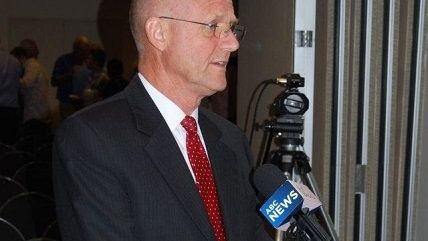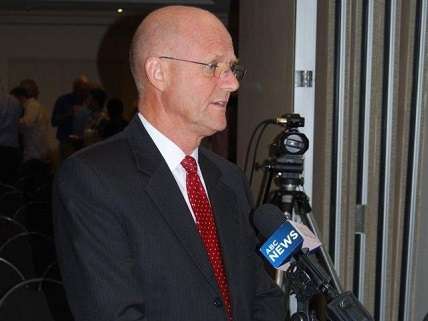The Outback Libertarian
In September, David Leyonhjelm was elected to the Australian senate as a member of the Liberal Democratic Party, a libertarian party founded in 2001.


In September, David Leyonhjelm was elected to the Australian senate as a member of the Liberal Democratic Party, a libertarian party founded in 2001. In August, reason's Scott Shackford spoke with Leyonhjelm about compulsory voting, the campaign against him, and why he's able to say things that no other politician can.
Q: You're the senate's sole representative of the Liberal Democratic Party. Does this make you the sole libertarian, or do you have allies who come close to a libertarian philosophy?
A: I'm the first politician, at least in the federal parliament, who's been elected on a libertarian platform, but there are libertarian-inclined people in the Liberal Party, which is the governing party. There are also people with some libertarian inclinations, at least on some issues, in the National Party, which is in coalition with the Liberal Party. And occasionally you'll find a couple in the Labor Party, which is the equivalent of your Democrats. But there's not very many of them and they tend to have big blind spots as well.
Q: How did Australia's compulsory voting laws and your placement on the ballot affect your chances?
A: We got nine and a half percent of the vote, and we attribute that mostly to the fact that the Liberal Party went on a campaign of warning voters not to vote for us in the week or so before the election. Talkback radio, which has huge reach, was constantly telling people not to vote for Liberal Democrats by mistake: "They're number one on the ballot but don't vote for them by mistake. They're not the Liberal Party." And then the day before the election, the biggest-circulation newspaper in New South Wales where I was elected ran a two-page spread, a huge big thing, with a picture of me and another guy from my party, warning, "Don't vote for these guys by mistake!"
Australians are a perverse people. There's a significant number of them that will do exactly the opposite of what they're told. It's actually quite an endearing feature about them. If they're told that the right thing to do is such-and-such they'll go and do the opposite. We think that was a major factor.
Q: Despite the fact that you may have benefited from compulsory voting laws, you have spoken critically of them.
A: We have a right to vote, and it's not a right if you get fined for not doing it. It becomes an obligation, like paying your taxes.
Q: In your maiden speech in July, you spent much of your time simply explaining the basics of libertarian or classical liberal philosophy. Did you feel it was important to explain where your political platform came from? Is that an indication there isn't a lot of understanding of the classical liberal philosophy in Australia?
A: There is a tendency to note anybody who believes in low taxes and less government expenditures as being far right. "A far-right extremist" is the term that gets thrown around quite commonly. So I have spent quite a bit of my time in the media-confusing the media if you like-by talking about right-wing issues and the soft-left social issues: same-sex marriage, marijuana, assisted suicide. Those sorts of things which the left thinks are their issues. I'm in the process of characterizing them as liberty issues. It's partly to head off this far-right extremist label. So it was important to set out the philosophical underpinnings of it to show it goes back a long time.
Q: What kind of response did you get from your maiden speech?
A: Very positive. Quite a number of senators who were in the chamber listening to me-it's a courtesy thing to listen to the speeches-many of them said, "God, I wish I could make a speech like that."


Show Comments (29)